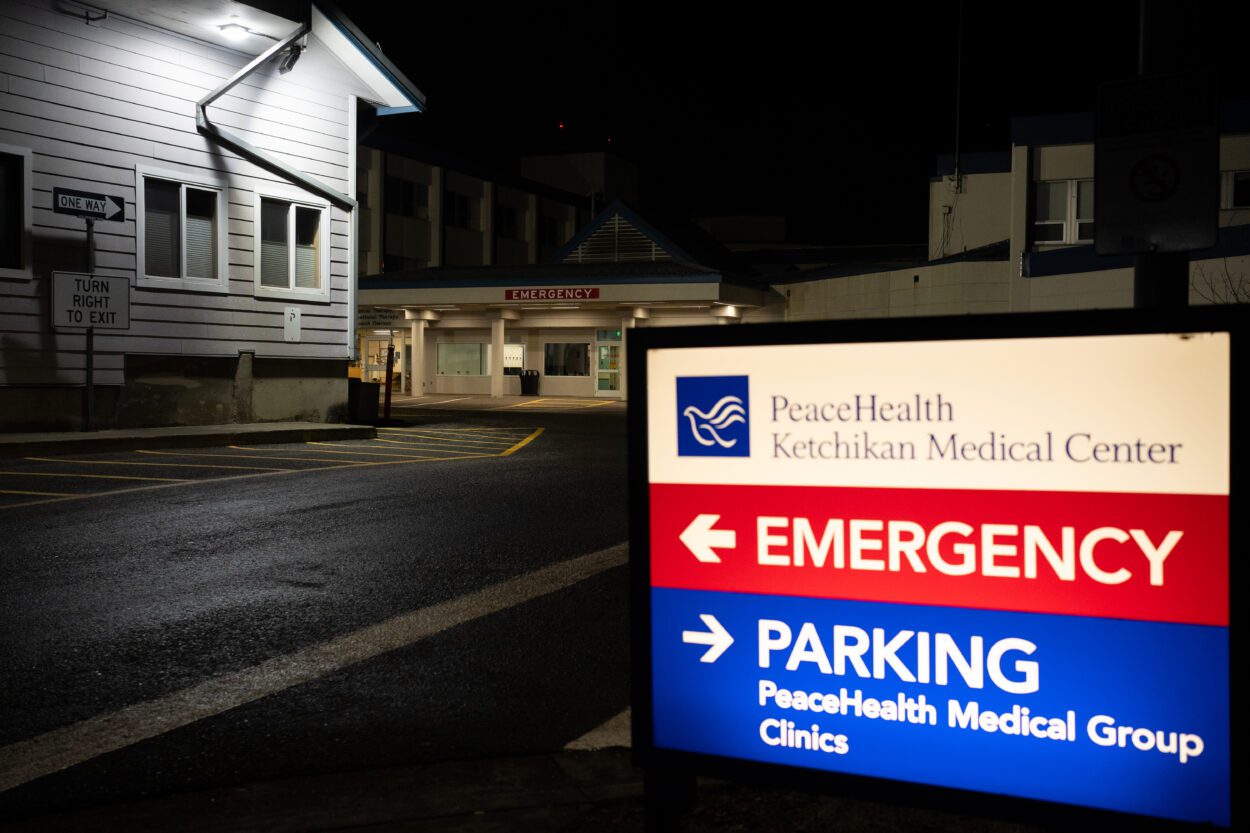
The PeaceHealth Ketchikan Medical Center Emergency Department is staffed 24 hours a day, and for many services, it’s the only option on the island. The medical center is a “critical access hospital” — if someone comes in badly hurt, the goal is to stabilize them until they can get them to a bigger hospital in Seattle or Anchorage. It’s often a critical step in keeping people alive.
Recently, though, emergency room physicians went multiple months without pay, and to some, the future of services seemed uncertain. Sarah Hines, a nurse practitioner in the PeaceHealth emergency room, said the physicians received an email at the end of October saying payroll would be late.
“Then I found out by just talking to the other providers that they weren’t getting paid at all,” said Hines. “So they had been working for free since the end of August. And additionally, NES couldn’t provide them with proof that they had medical malpractice insurance.”
NES Health was a third-party firm that staffed PeaceHealth’s emergency department. Jared Kosin, CEO of the Alaska Hospital and Healthcare Association, said companies like NES are basically a one-stop staffing shop — the hospital pays a fee and the agency provides a group of physicians. They also provide malpractice insurance, which is extremely risky for an emergency physician to work without.
“The group still becomes integrated in the community, but it’s a way of basically contracting for services and having them take care of the recruitment and supply of the physicians, the billing, all of that stuff,” said Kosin, whose non-profit represents and supports hospitals across the state. Kosin explained that it is “very normal” for hospitals to contract with third-party staffing firms, especially medical centers in rural or remote locales.
The California-based company staffed around 35 ERs across the country — everywhere from Ketchikan to Texas to Philadelphia. At the end of October, they sent those hospitals scrambling when they announced that they didn’t have the money to pay their doctors.
In the October email from CEO Jose Aguirre’s office, NES blamed the missed paychecks on transitioning to a new billing company. It’s just a “temporary shortfall,” they said. “Rest assured that everyone will be paid and made whole.”
But that never happened.
Instead, Aguirre and the firm’s chief medical officer soon resigned. At the end of November, they sent a brief saying the company would “wind down its operations and cease doing business.”
Hines said at this point, there was a deep sense of unease among the staff.
“I mean, that’s just dangerous for them, because that’s their whole livelihood at stake,” Hines said. “And then we have some new providers who just recently moved to Ketchikan to cover and help us out. They were going to be long-term providers here, and they can’t pay their bills.”
Kosin said for physicians and hospitals, the situation was dire.
“That’s a huge deal, right? If you’re not getting paid for doing your job, that affects your livelihood, and ultimately can affect your ability to be there and be present in that situation,” he said.
Some hospitals across the country did have to suspend services and shut down their emergency rooms in recent weeks due to NES’s closure. In Ketchikan, though, emergency room physicians and staff kept working — without pay.
“They can’t pay their bills if they don’t have payment,” said Hines. “I know these physicians really want to stay here and they want to provide for the community, but their hands are kind of tied right now because of NES.”
Could PeaceHealth have stepped in to pay the physicians in the interim? According to Kosin, the laws around how doctors get paid could complicate that.
“I think there would be a lot of compliance and analysis that would have to be done to make sure everything is being done in a way that complies with all the rules and regulations that are in place at the federal level,” he speculated.
PeaceHealth Ketchikan’s Communications Manager Kate Govaars confirmed that in an email, saying that “Due to legal limitations, PeaceHealth is not able to provide coverage for work done under NES.”
In mid-November, the physician’s group entered into an agreement with the hospital to keep working. A staff member who wanted to remain anonymous provided KRBD with a screenshot of a clause in the contract addressing the unpaid wages. It said PeaceHealth “desires and intends to provide additional compensation to [Physician] in recognition of uncompensated services [Physician] provided at the Hospital.” However, the contract said that the compensation for wages lost under NES was not “addressed in this Agreement.”
The Ketchikan Medical Center is one of ten hospitals operated by PeaceHealth. The not-for-profit healthcare organization operates hospitals and clinics across the Pacific Northwest.
In an email, Govaars confirmed PeaceHealth extended contracts that covered malpractice insurance and compensation, but Govaars said she couldn’t comment on the new contract or any additional agreements because “The nuances of individual contracts gets into personnel maters [sic], which PeaceHealth holds confidential.”
Govaars also wrote that PeaceHealth is committed to keeping the emergency room open and that hospital leaders “care deeply for our staff and value the care they extend to the community.”
“This group we have now is just fantastic,” Hines, a six-year Ketchikan resident, said of the current ER physicians. “They’re really good, and our community would really benefit by keeping them here. The problem in Ketchikan is we just don’t have a pool of people to pull from.”
Hines said the physicians’ last payment from the staffing firm came at the end of September, for the work they did in August. By the time PeaceHealth started paying them at the end of November, the Emergency Room staff were out two-and-a-half months of wages, with no guarantee they’d ever see that money.








